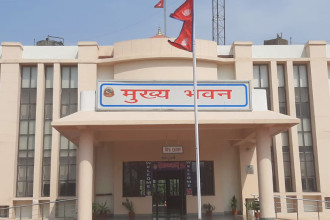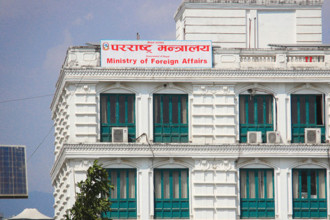.jpeg)
KATHMANDU: beed management, an international management consulting and financial advisory services firm, hosted an event on Wednesday to launch Indian author Gurcharan Das's book, 'Another Sort of Freedom'.
Das, the former CEO of Procter and Gamble India, has authored a much-acclaimed trilogy — India Unbound: from Independence to the Global Information age; The Difficulty of Being Good; and Kama: The Riddle of Desire — based on the classical Indian ideal of life's goals.
Individuals from various areas of interest including philosophers, economists, musicians and the author's admirers attended the event held in Kathmandu.
Kiran Krishna Shrestha, Publisher and Music Promoter at Nepa-laya facilitated the conversation with Author Das welcoming all the attendees and providing the introduction of the book “Another Sort of Freedom”, which is a memoir of a man’s struggle to break free from expectations.
Addressing the event, Das said that when he was two years old, he was considered to be restless, at four 'difficult' and after a certain time, considered a troublemaker. He said,"I began with all three traits and I still have those. I started running when I was three years old and since then I have been running.”
Highlighting his childhood memoir mentioned in the book, Das said, “When I was in kindergarten, we were in a class of 20 children, all of us had pencil boxes and one of the students, who was the richest among all, had two pencil boxes and a kid called Ayan didn’t have any pencil boxes. One day, when the classroom was empty, I took one of the two pencil boxes and put them on Ayan's desk. The rich kid screamed. Though Ayan didn’t do it, he was punished. I never understood what happened that day except to say it must have been temporary insanity. Author Das talked about Punjab which was the border state at the time of partition between India and Pakistan. Almost 20 million people were displaced. He recalled, "One day, when I along with my family were travelling on a train, we saw a Muslim policeman giving orders at a platform when suddenly two teenagers were shot dead. My mother immediately shut the window of the train compartment. That's the symbol of madness that gripped suddenly in India and Punjab.”
Das said he lived in London, Latin America and dozens of other places but the only home for him was the Indian subcontinent.
Further, Das shared a funny incident from his college days. “In America, there was racial discrimination and people used to categorise people as Black and white. I recall a memory from when we were playing 'Spin the Bottle'. According to the rule, whoever the head of the bottle pointed at on coming to stationary, he/she had to kiss the nearest person of the opposite gender and the rule also suggested that a black girl kiss a black boy and a white girl Kiss a white boy. When it was my turn, I was confused. However, I solved the problem by kissing a black girl as well as a white girl and I kept getting bonus points. I kept kissing all evening long.”
Das, who grew up in the border state of India, shared that he was not aware of the caste system as there used to be a mixture of people from every background including Hindus and Muslims. “Actually, I learnt about the caste system when I was studying in America,” he stated.
Das mentioned his parents' advice on Life vs Living and shared how his mother would ask him about his progress report card, and whether he secured first position. His father would stop her from asking such questions to their son. "He suggested my mother should ask me what I liked about the school, my hobbies and interests," Das said and added that he pursued both in life because both contrary advice from his parents were practical.”
For Das, happiness is the key to success. In every work he ever performed in his life, he always sought happiness in it. “When the Dean asked me the reason for choosing my subject (Philosophy), I told him that I wanted to learn about happiness as my purpose of living is to always be happy.”
Das shared various aspects of the book “ Another Sort of Freedom” relating to his personal and professional life.
Responding to Shrestha, who out of curiosity, asked Das about his interest in being a religiously secular person, Das answered, “Practising Hindus, I believe, my wife and grandmother are far more secular. Hindus have three hundred crores of gods and no gods can afford to be jealous. So you learn tolerance from day number one. "Even the formation of the Hindu religion is unknown. So, the temples of the subcontinent are liberal. So, I feel the shelf life of Hindutva is very limited.”
The event concluded with an interaction with Author Das.
Reporting by Ashika Pokharel





-1772534372.jpeg)